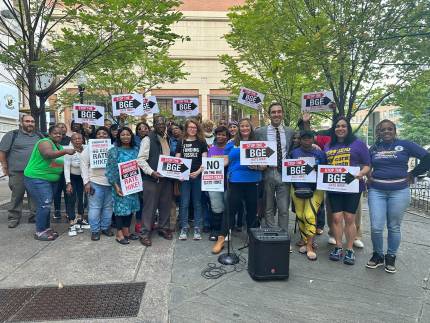
I’m Taylor Smith-Hams (she/her), a U.S. Senior Organizer at 350.org based in Baltimore, MD. 350 US has made it a campaign priority to fight investor-owned utility companies because we know that economic justice and climate justice are intertwined. Across the country, these companies are blocking our transition to renewable energy while raising rates on working families.
The major utility company where I live, called Baltimore Gas & Electric (BGE), is a prime example of how investor-owned utilities are climate villains.
BGE is currently proposing a $602.4 million rate increase over the next three years. If allowed to move forward, BGE’s plans would increase the average customer’s bill by $810 per year. This outrageous rate hike would disproportionately impact Baltimore, which has the highest net energy burden in the state of Maryland at 11%. (Net energy burden refers to the percentage of household income that goes toward energy costs).
And what’s driving these unaffordable and unjust rate hikes? You guessed it: fossil fuels. BGE’s plan to spend $1.8 billion on new fossil gas infrastructure (p. 6) is the key force behind these rate hikes. While the company has been framing this fossil fuel infrastructure buildout under the guise of “safety,” it’s clear that this is about profit.
According to an analysis from the Office of the People’s Counsel, BGE is spending more than $6,000 per home on their new gas equipment program. But they plan to recover that investment at an average of at least $19,000 per house – turning quite a profit for their shareholders. All the while, BGE would be locking in more fossil fuels across its service territory in central Maryland and flouting the state’s climate goals.
But the people are fighting back.
How Baltimore is Fighting Back
Dozens of ratepayers in Baltimore City, Howard County, and other impacted jurisdictions across Maryland have testified against BGE’s rate hikes and fossil fuel infrastructure buildout at recent hearings. They have called out the utility for putting profits above people and the planet.
Liz Bement, a community leader in the Upper Fells Point neighborhood, warned Commissioners at an August 13th hearing that “the residents of Baltimore City are the collateral damage in BGE’s quest for shareholder profitability, placed above their required mission as a public utility to provide equitable and safe service to the citizens of Baltimore.”
During a virtual hearing on the rate hike proposal, college student Roric Coletta told the Public Service Commission (PSC) that the recurring power shutoffs in his neighborhood during extreme heat this summer were actively harmful to his health. Coletta has a health condition that is exacerbated by heat. “People can’t be expected to pay already rapidly increasing energy rates when their quality of service is subpar,” concluded Coletta.
Founding member of Baltimore 350, Dave Neun, explained the climate implications of BGE’s fossil gas infrastructure buildout at a hearing on September 20th, pointing out the climate costs of methane and how BGE’s plans contradict Maryland’s climate goals. “In the next 20 years, that’s super warming. That’s the storms that are going to affect our city, that are going to affect our area, and we have to pay for the rebuilding when it hits us.” He concluded, “so that’s a waste of money right there, especially when the state has clearly declared that we need to reduce our emissions by 60% by 2031 and reach net zero by 2045.”
What You Can Do to Support
Check out this video to learn more about BGE’s plans to raise rates to fund more fossil fuels, the impacts to everyday Marylanders, and how ratepayers are fighting back. And take action! Sign this petition to the PSC telling them to reject BGE’s outrageous rate hike and to use its authority to put Maryland on a path toward climate justice.
The post What Baltimore Teaches Us about Why Utility Rate Hikes are a Climate Justice Issue appeared first on 350.


0 Commentaires